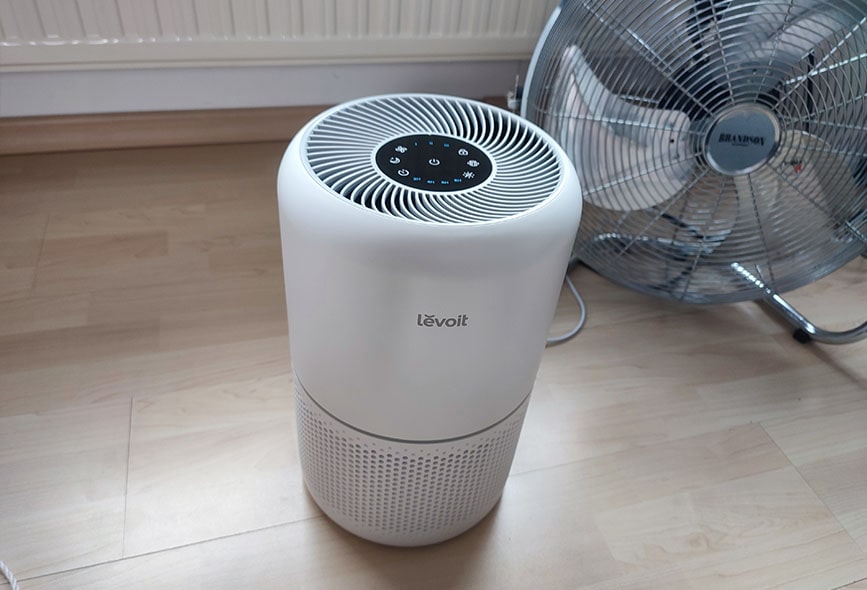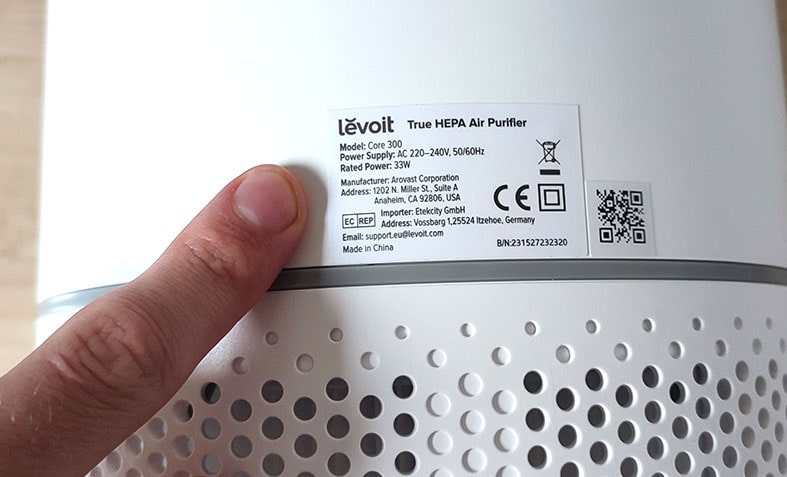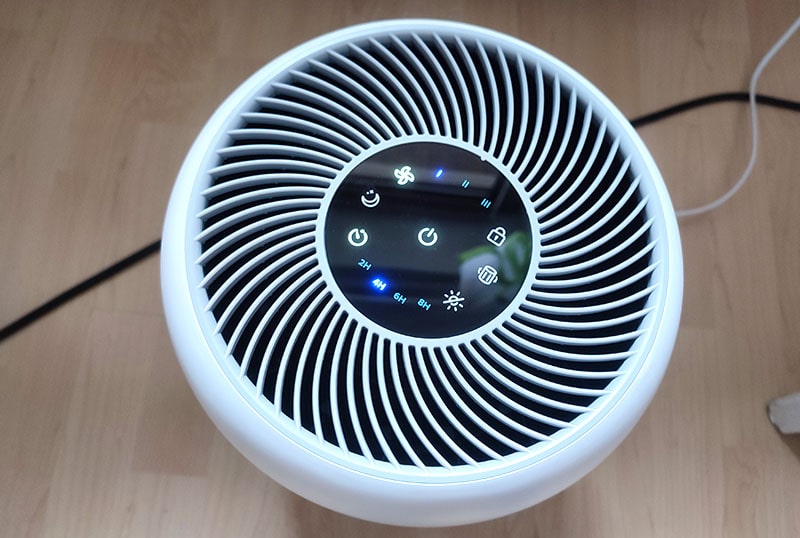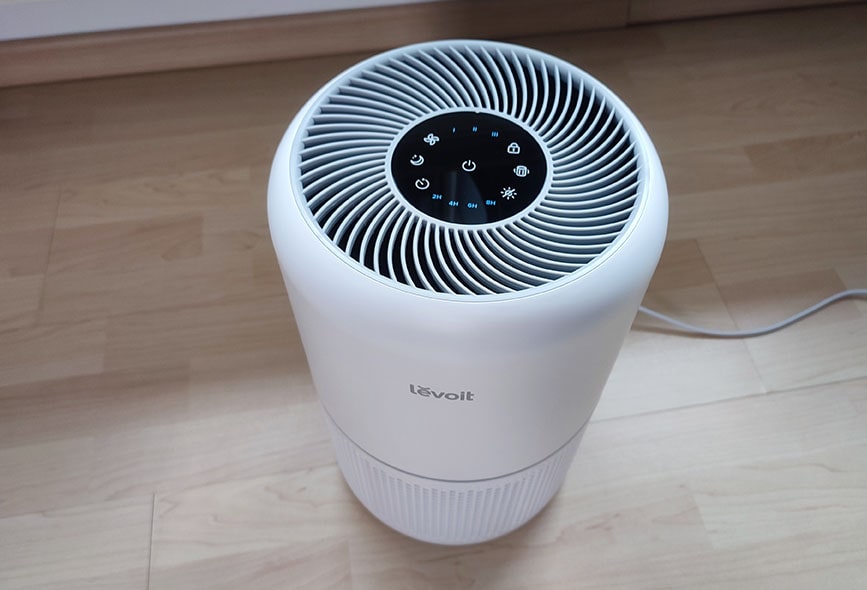Can you run an air purifier 24/7 (all day, every day)?
This article is all about this question. But we don’t stop there. After reading this, you’ll not only know exactly if you can run your air purifier all day, but also whether it even makes sense.
My goal is not just to tell you what to do. A lot of search results are totally useless. For example, when I search for “Can you run an air purifier all day?”, the first result tells me “Yes”, but does not explain why. (I need a why!)
Another search result a bit further down tells me “No”, with the justification that it’s too expensive, while not telling me how much it costs!
So, how the heck can I make my own educated decision? It’s impossible.
And here’s where this article comes in.
I will answer everything you ever need to know about running your air purifier all day. And I provide numbers, facts, and figures. And, as always, human reasoning.
I’ll try to keep everything simple and straightforward. You’ll know more about air purifiers than 95% of people at the end of this article.
Can you run an air purifier 24/7?
Let’s approach the question from a couple of different perspectives:
- the technical perspective: is it technically possible to run an air purifier all day?
- the financial perspective: how much does running an air purifier all day cost?
- the self-questioning perspective: is there even a point in running an air purifier 24/7?
Before all, let’s start with the quick answer!
Quick answer: Yes, you can run an air purifier 24/7. Air purifiers run on low power and don’t overheat. The monthly running cost for a typical air purifier on “Medium” airspeed setting is $3.80. Usually, though, running your air purifier for more than 8 hours a day yields diminishing results and the particle-collection rate decreases.
Let’s have an in-depth look:
How long can an air purifier run continuously?
Electric devices (and machines in general) always have one weak spot: their moving parts. Anything that moves within a device, can’t run indefinitely. Over time, any moving part wears down.
The question is just: how long do the moving parts last?
The only moving part in an air purifier is the built-in fan. Also, you can think of the HEPA filter as a technically moving part, since it changes its physical properties (weight, volume, moisture, etc.) over time as it collects particles.
In high-power devices, let’s think of a racing car motor, the moving parts don’t last long at all. If you floor the gas pedal all the time, the motor has to withstand so much friction, it probably fails within a couple of hours.
Luckily, this is not the case for air purifiers. Air purifiers are very low-power devices. So, there is very little friction inside it.
Does an air purifier fan withstand 24/7 running?
The lifetime of fan bearings is roughly 50,000 hours.
50,000 hours ÷ 24 hours per day ÷ 30 days per month ÷ 12 months a year ≈ 5.787 years ≈ 5 years and 9 months
So, an average fan inside an air purifier can run for 5 years and 9 months continuously.
That’s a lot!
The reason fans last so long, even though they do all the heavy lifting inside the air purifier, is that fans are incredibly optimized.
Manufacturers all around the world have been producing fans for cars, computers, ovens, etc. for decades. And each little improvement is copied by the competition.

How long does the HEPA filter last?
Of course, the built-in HEPA filter does not move. So, it does not wear down due to friction.
Over time, however, a HEPA filter collects dust, which wears the HEPA filter down.
Gus from smartairfilters.com did an interesting experiment on how long a HEPA filter lasts using a particle counter.
He runs his air purifier every night. I assume he runs it at night because he is not at home during the daytime.
After inserting a new HEPA filter, he measures the number of particles every day.
The results are:
| Air purifier running time | Filter effectiveness (measured through the reduction in room particles) |
| 0 days | 100% |
| 120 days | 90% |
| 160 days | 80% |
| 200 days | 50% |
Here’s the image with all measurements:

As you can see, after the 160 days mark, HEPA filters start becoming useless. They don’t technically fail (as if they suddenly stop working), but they appear to have a half-life.
My assumption would be that after 160 days, HEPA filters are so clogged with dust, that they just stop being effective.
The experiment was done in Beijing (where air pollution is high). Possibly, results in your area look a bit better.
These guys recommend replacing HEPA filters every 6 months. Which makes sense. However, since they run their air purifier overnight only (for 8 hours a day), it is possible that your air purifier collects more dust when you run it 24/7.
We will have a closer look at whether longer running times actually cause more particle collection later in this article. So stay tuned.
Still, let’s stick to the general recommendation as a bottom line:
You should replace your HEPA filters at least twice a year!
Yes, you can technically run your air purifier 24/7. The built-in fan can run for years on end. You only have to exchange filters every 6 months.
How much does running an air purifier 24/7 cost?
Let’s have a look at the financial aspect and open with the following quote:
“I don’t think [air purifiers] cost that much to run 24/7 – but they’re worth their weight in gold to me.”
TFW46 (forum member)
It seems that people like air purifiers a lot. Let’s put a number on air purifier running cost.
I’ve written an extensive article about air purifier running costs just yesterday! So, let me conclude the findings for running an air purifier 24/7.
At an average electricity rate of 16 cents per kWh, an average 33W air purifier costs:
- $0.13 per day (24 hours)
- $3.80 per month (30 days)
- $46.25 per year (365 days)

A set of two replacement filters usually costs between $20 and $50. Original replacement parts are more expensive, while aftermarket replacement parts are cheap.
This adds a fixed average cost of $35 to the yearly running cost if you replace filters twice a year.
The total cost to run an air purifier 24/7, including electricity and filter replacements is $81.25.
Does night mode reduce running cost?
In night mode, air purifiers consume a lot less electricity. An average 33W air purifier’s power consumption reduces to 10W in night mode, according to an amazon reviewer named Melody Reed, who measured the power consumption of the Levoit Core 300S (my favorite air purifier) using a Kilowatt-meter.
If you run your air purifier in night mode (at 10 Watts) for 8 hours of the day and at “Medium” (33 Watts) for the remaining 16 hours, your running cost reduces to
( 16 hours × 33W + 8 hours × 10W ) ÷ ( 24 hours × 33W ) ≈ 76.7%
Night mode reduces your air purifier’s power consumption by 23.4%.
It’s safe to conclude running an air conditioner 24/7 is not expensive. Night mode helps cut the cost even further.
But is there a point in running an air purifier all day?
Now that we know that you can technically run an air purifier all day and that it won’t cost you much, let’s have a look at the final question:
Does it make sense?
Just because something is technically possible and affordable to do, does not mean you should do it.
Let the questioning begin:
Does running an air purifier in night mode even make sense?
If you run your air purifier 24/7, you likely use night mode to reduce the noise and power consumption.
Here are my thoughts:
An air purifier can collect particles easily when they float around. You need very little airflow to suck in floating particles.
The more movement there is in the air in your home, the more particles float around.
During the night, particles tend to settle. Of course, most floating particles are so lightweight, they settle very slowly. So, we speak about tiny effects.
To collect the same number of particles at night as during daytime, you need more airflow. Not much more, but a little more.
In night mode, the air purifier reduces air speed to roughly a third of the “Low” setting.
So, yes, night mode does work and, yes, the air purifier does collect particles at night. However, the particle collection rate is reduced a lot.
Night mode only makes sense if you have an allergy or asthma, or if you live in a high-pollution area and sleep with your window open.
In all other cases, running an air purifier during the daytime should be more than enough.
Does running an air purifier when you’re not at home make sense & is it safe?
Yes, you can run your air purifier when you’re not at home. I’d even argue that it makes a lot of sense to do so.
When you return home, the air is as fresh as it gets and you don’t have to wait for the air purifier to do its job.
Technically, it’s absolutely safe to run your air purifier in your absence. Since most home air purifiers consume under 60W of power, they can’t overheat, meltdown cords, or cause fuses to trip.
According to the formula
Current (in Amps) = Power (in Watts) ÷ Voltage (in Volts)
the maximum current a strong 60W air purifier draws from a regular 120V US wall outlet is:
60 Watts ÷ 120V = 0.5 Amps
On European 230V wall outlets, the amperage is even lower:
60 Watts ÷ 230V ≈ 0.26 Amps
Considering some phone chargers draw up to 2 Amps, the amperage of an air purifier is very low.
Do air purifiers running 24/7 collect more particles?
Yes, the more you run your air purifier the more particles, aerosols, and bacteria it will collect.
However, the difference might not be worth it.
For example, if you run your air purifier for 16 hours a day, that’s a running time reduction of 33% as compared to running it all day.
That does not mean that your air purifier particle reduction reduces by 33%. Rather the following is true:
There is a large portion of particles in your home that are easy to collect. These are the particles floating around in the air. They are the “low-hanging fruit”.
I’d estimate 80% of particles belong in this category.
Your air purifier filters those particles within the first couple of hours of running it. After those first few hours, the majority of easy-to-collect particles are already filtered.
That’s what the first, say, 4-8 hours, of running time get you.
After that, there remain just a couple of hard-to-collect particles. These are hard to collect because they are at the far end of your room. Or they stick to objects in your room because of an electrical charge.
For the remaining 16 hours of your day, an air purifier is busy trying to collect the 20% of particles, which make up 80% of the work.
Running an air purifier for increasing time periods yields diminishing returns.
After running your air purifier for 8 hours, the majority of particles in the air in your living space are filtered. Any running time beyond that will collect fewer and fewer particles.

Do not run your air purifier all day because you fear dust and bacteria
Air purifiers are great for collecting dust and freshening the air. However, you should not run your air purifier all day for health reasons.
“Unless you live on a building site, or the air quality is really that bad, an air purifier is unlikely to “protect” [you or] your child in any meaningful way”
CashStrapped
First and foremost, the pollution levels in most places do not justify running your air purifier all day.
Remember the HEPA filter experiment we looked at earlier: 8 hours of filtering were enough. And the experimenter lives in Beijing, a city with much higher pollution than almost anywhere in the US or Europe.
Actually, running your air purifier all day creates a negative spiral. It worsens your immune system, which, in turn, forces you to run your air purifier more.
“Living in a dust-free, artificially clean environment will just make you or your child more susceptible to everyday pollution as soon as you or he steps outside the house.”
matelodave
I do not recommend running your air purifier all day.
Conclusion
Yes, you can run an air purifier 24/7. However, running your air purifier for increasing time every day yields diminishing air purification results. Usually, 8 hours of running time a day is more than enough to clean the average home.
Also, do not fear the pollen. Making your home overly sterile helps nobody and actually has an impact on your immune system.
You should avoid using an air purifier all day for health reasons. Instead, use it to have fresher, less smelly air in your room, and to collect dust.
That’s where air purifiers shine.
I hope this article helped you! You can always shoot me an email if you have any questions.

